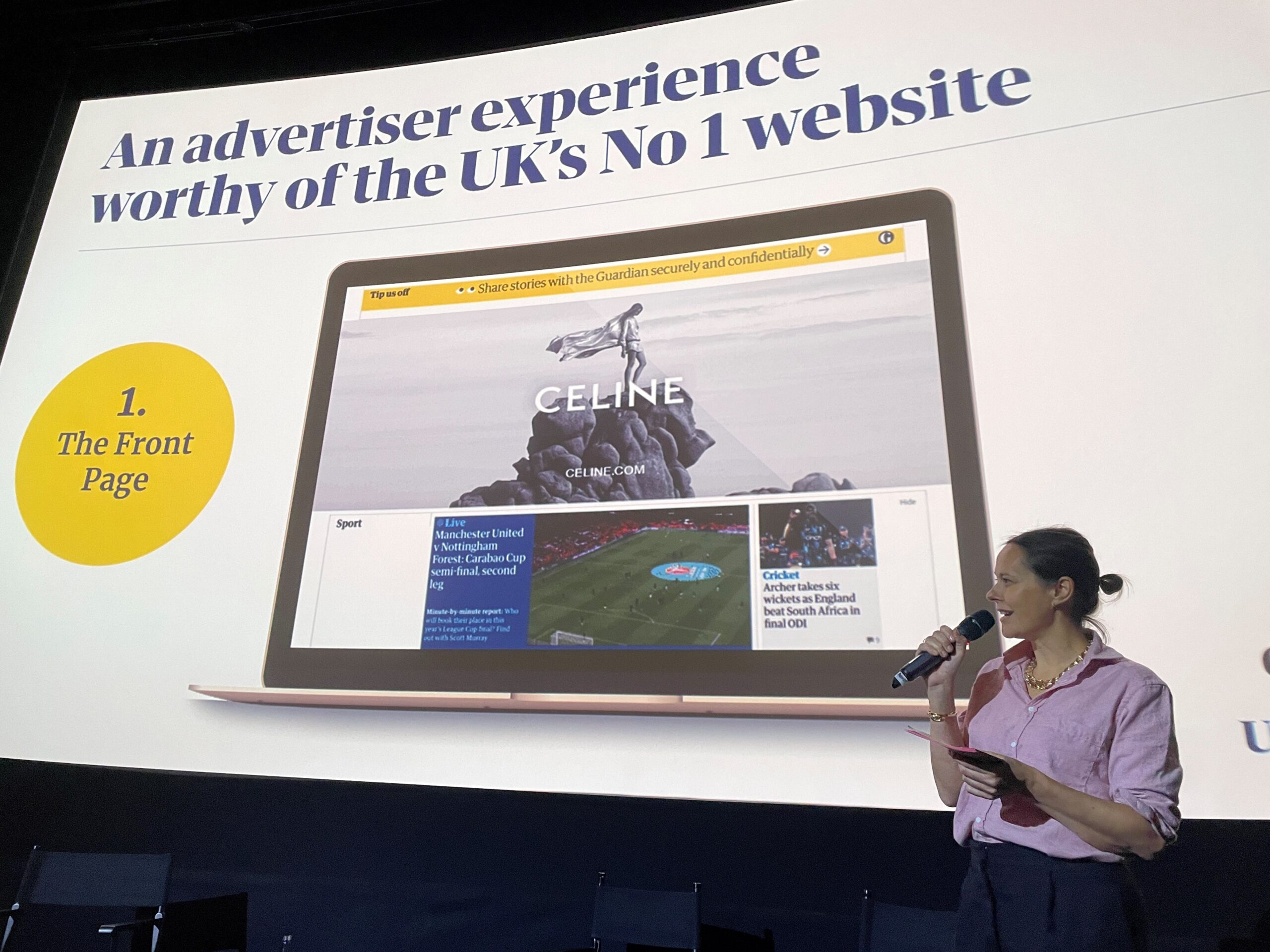“Hopefully we can dispel a few myths about us being difficult to work with. Because while we may not be answerable to a billionaire, or the stock market, or private equity, we are very grateful to sell you great advertising.”
That was Guardian Media Group CEO Anna Bateson reaffirming the importance of advertising to The Guardian‘s business model as she kicked off The Guardian Advertising’s upfronts in London today.
The newsbrand revealed a number of new ad products, the launch of The Guardian Advertising Awards, and pushed home the message that its readership is mainstream — not just progressives who “eat tofu and drink homemade oat milk,” as director of agency relationships Jordan Taylor later described.
The Guardian‘s answer to cookie deprecation: Guardian Light
The Guardian announced two new ad formats: a new front page (pictured, below) that can now offer more and significantly larger ads, and an “interscroller” which shows ads as users scroll down the page as they read an article.
But perhaps of most interest was the announcement of Guardian Light, the outlet’s answer to the deprecation of third-party cookies.
Previously, any user who hit “reject all” on the cookie consent pop-up users are shown when accessing the site would not see digital display advertising. The Guardian estimated this accounted for about 30% of its readership.
But now, The Guardian, in partnership with Opt Out Advertising, will be able to deliver contextual ads to those readers without using third-party or first-party cookies, tracking, or auction technology.
The newsbrand claims the Guardian Light solution is the first of its kind to be launched by a publisher in the UK.
The importance of trust
The Guardian, Bateson said at the outset of the upfronts, can offer scale, influence, and integrity to advertisers.
Chief advertising officer Imogen Fox followed by remarking that The Guardian has perhaps become “a little bit more famous for the advertising that we don’t take rather than the advertising we do.”
The Guardian is one of scant few publishers to have banned ads from fossil fuel companies, and this year it moved to ban ads from gambling companies as well. James Fleetham, The Guardian‘s director of clients, marketing, and research, added that, perhaps because of its reputation, The Guardian doesn’t “have an awareness problem, we have a consideration problem.”

But, the pair argued, the newsbrand should be top of mind for advertisers.
They remarked that, partly because The Guardian does not have a paywall, it is the best-read quality newsbrand in the UK. The newsbrand receives an audience of 9 million people daily across its products, and counts over 1 million “paying supporters.”
Fox contrasted those figures against commercial TV programmes, which she said had failed to reach such a large audience in any one instance over the past year.
She emphasised the importance of trust for advertisers. Declaring The Guardian “the most trusted newsbrand… ever” (“Ever. Why not?” laughed Fleetham), she invoked recent research from effectiveness expert Peter Field, which has found trust to now be closely associated with advertising effectiveness.
Given The Guardian‘s proposition as a highly trusted newsbrand and the encroaching concerns of the spread misinformation online, Fleetham followed, the publisher should be increasingly valuable to brands of all kinds seeking a trusted association.
Brand opportunities for all categories of news
The duo outlined five different types of brands they feel are well suited to advertise effectively with The Guardian.
“We think The Guardian‘s probably already got a pretty good reputation for being a good place to advertise charities or B Corp businesses, or even Birkenstocks. And it’s true that we’re not for everyone. But there are certain types of advertising that we’re really good at,” said Fox.
The brand categories, which will coincide with the five different award categories The Guardian Advertising will give out at its inaugural award show, to be hosted next spring, include:
- Brands connecting with big moments
- Everyday brands
- Challenger brands
- Brands doing the right thing
- Premium brands
While The Guardian is well known for its left-leaning coverage of politics and global events, the upfronts generally emphasised other, more advertiser-friendly propositions the paper offers for these types of brands. These include the ability for brands to connect with cultural touchstones like the latest episode of Strictly Come Dancing, which The Guardian offers minute-by-minute coverage of.
That does not mean that advertising beside hard news is not brand safe, Fox later told The Media Leader. She said brands should be willing and able to advertise against the outlet’s high-quality journalism, including its political journalism.
Nevertheless, if their upfronts is anything to go by, the newsbrand feels its important to emphasise that its audience, while progressive, should not be pigeonholed.
After all, as Fox noted, Guardian readers are also consumers with interests beyond current affairs.
Peter Field interview: The advertising effectiveness expert will speak to editor-in-chief Omar Oakes for The Media Leader Podcast next week. Field will present findings on trust, attention, and effectiveness at our Future of TV Advertising Global event, which takes place in London on 5 and 6 December.
Credit: Source link




